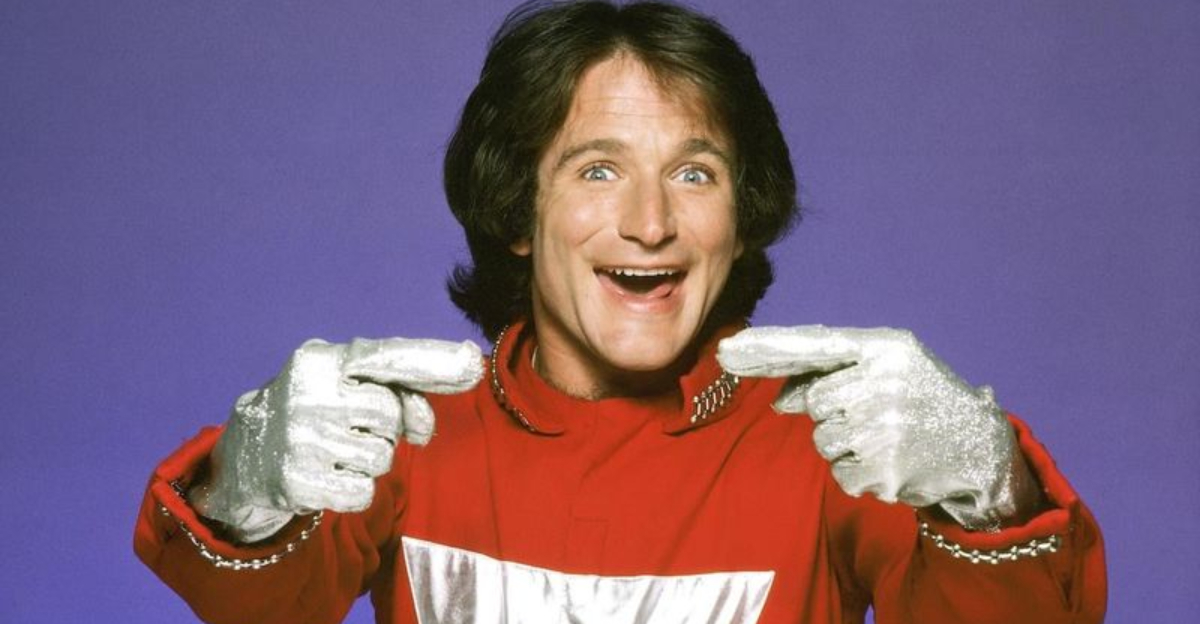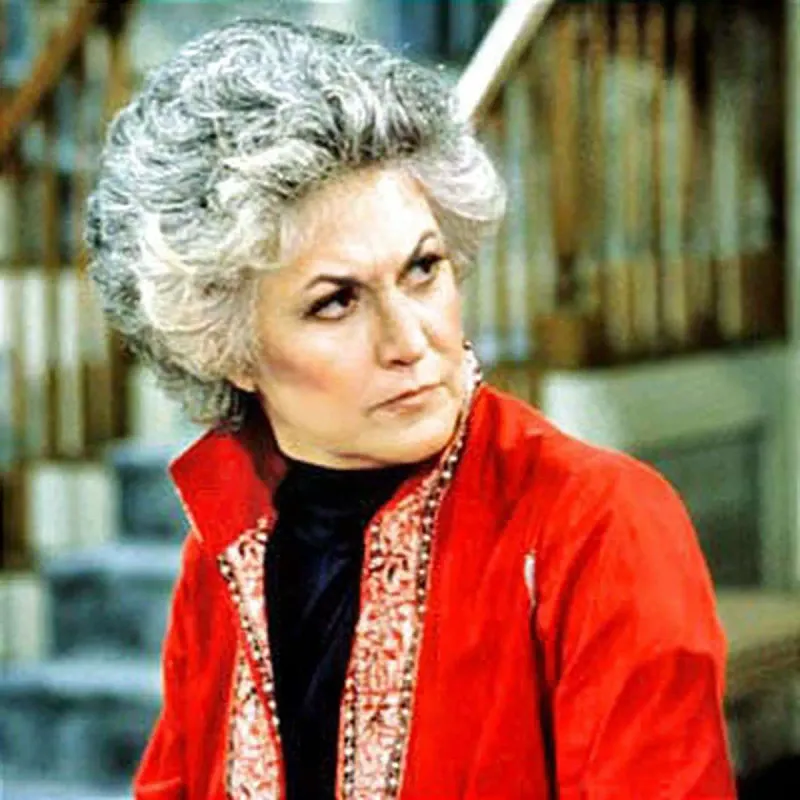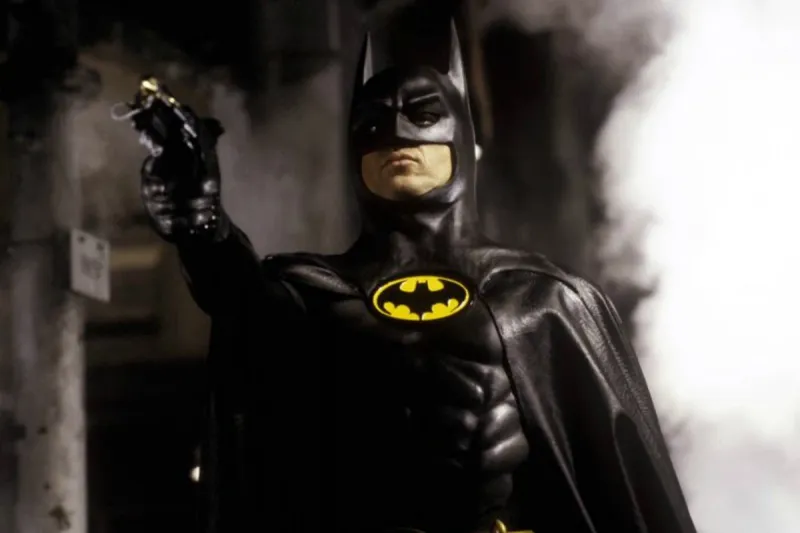The 1970s was a transformative era for television, marked by iconic shows and memorable catchphrases. However, many of these catchphrases, once popular, are now viewed through a more critical lens due to shifts in societal values.
Language that was commonplace back then can be considered offensive today, reflecting changes in attitudes towards race, gender, and cultural sensitivity.
This blog post explores 25 TV catchphrases from the ’70s that might raise eyebrows if used today. Join us on this nostalgic yet enlightening journey as we revisit these expressions and understand why they wouldn’t fly in today’s world.
1. “Sit on it!” from Happy Days
Remember the cool and charismatic Fonz from Happy Days? “Sit on it!” was his signature phrase used to dismiss others casually. Back then, it was seen as a light-hearted rebuke, often bringing laughter.
However, in today’s context, such dismissive language might be interpreted as disrespectful or rude. Society now encourages more empathetic communication, particularly in public discourse.
The catchphrase, though iconic, reflects an era where humor sometimes took precedence over sensitivity. In the era of social media, where words have wide-reaching impacts, such a phrase might not be well-received.
2. “Kiss my grits!” from Alice
“Kiss my grits!” became a famous quip from the sitcom Alice. Flo, the sharp-tongued waitress, used it to express annoyance or dismissiveness. The humor lay in its playful yet sassy delivery.
However, phrases involving physical gestures, even metaphorical ones, are considered less appropriate today.
Modern workplace cultures prioritize respect and inclusivity, and such expressions, although humorous in the past, might now be seen as undermining professionalism.
This catchphrase reminds us of a time when comedic boundaries were different, and serves as a reflection of changing societal norms.
3. “Whatchoo talkin’ ’bout, Willis?” from Diff’rent Strokes
Arnold Jackson’s catchphrase, “Whatchoo talkin’ ’bout, Willis?”, was beloved by audiences of Diff’rent Strokes. It was delivered with a mix of disbelief and sass, often highlighting Arnold’s youthful innocence.
Despite its popularity, the phrase’s use of non-standard English might draw criticism today for perpetuating stereotypes. Language sensitivity has increased, promoting more accurate and respectful representations.
While the phrase evokes nostalgia, it also reminds us of the importance of evolving language standards. Today, dialogues aim to break down stereotypes rather than reinforce them, reflecting progress in media representation.
4. “Up your nose with a rubber hose!” from Welcome Back, Kotter
Vinnie Barbarino’s cheeky retort, “Up your nose with a rubber hose!”, became synonymous with Welcome Back, Kotter. Its humor relied on its absurdity and the rebellious charm of the character.
However, phrases involving metaphorical insults can seem immature and disrespectful by today’s standards. Modern audiences tend to favor wit and intellect over silly putdowns.
Such catchphrases highlight the evolving taste in humor, moving towards more sophisticated and mature expressions. They serve as cultural artifacts from a time when playful insults were mainstream and reflect changing comedic sensibilities.
5. “Dyn-o-mite!” from Good Times
J.J. Evans from Good Times popularized “Dyn-o-mite!” with his exuberant delivery. It became a symbol of his character’s energetic and optimistic nature.
Yet, the exaggeration and stereotype of loud, overly expressive characters can be viewed critically today. Modern portrayals focus on depth and authenticity rather than catchphrases.
This once-celebrated expression now serves as a reminder of how certain depictions can inadvertently reinforce stereotypes.
The evolution of character representation encourages more nuanced and respectful portrayals, moving beyond simple catchphrases to convey personality and emotion in more thoughtful ways.
6. “Nanu Nanu” from Mork & Mindy
Mork’s greeting, “Nanu Nanu,” from Mork & Mindy, added an alien charm to the show. Its whimsical nature captured viewers’ imaginations.
However, today’s audiences may question its cultural sensitivity, considering it mimicked foreign accents and phrases for comedic effect. Modern comedy increasingly values authenticity and respects diverse languages and cultures.
While “Nanu Nanu” is a nostalgic symbol of sci-fi humor, it highlights the need for comedy that considers cultural implications. As humor evolves, care is taken to ensure that creativity doesn’t perpetuate cultural insensitivity, while still entertaining audiences.
7. “Sock it to me!” from Rowan & Martin’s Laugh-In
“Sock it to me!” was a catchphrase from the sketch comedy show Rowan & Martin’s Laugh-In. It was used to cue comedic skits or jokes with an energetic flair. While light-hearted, the phrase might now be scrutinized for its aggressive undertone.
Modern humor tends to avoid language implying physical action, preferring verbal wit. This phrase is a glimpse into comedy’s past, where physical and slapstick humor dominated.
Today, entertainment often seeks to engage audiences through clever dialogue and innovative storytelling, reflecting a broader understanding of humor and its impact.
8. “One of these days, Alice, pow! Right in the kisser!” from The Honeymooners
Ralph Kramden’s recurring line in The Honeymooners, “One of these days, Alice, pow! Right in the kisser!”, was delivered with comedic frustration. Today, however, references to spousal violence, even in jest, are unacceptable.
This catchphrase underscores how sensitivities have shifted towards more respectful portrayals of relationships. Modern media avoids normalizing violence, emphasizing communication and mutual respect.
This phrase serves as a historical reference, illustrating past comedic practices and their evolution over time. It highlights the importance of aligning humor with contemporary values, ensuring sensitivity and respect in entertainment.
9. “I’m Chevy Chase, and you’re not.” from Saturday Night Live
Chevy Chase’s self-assured sign-off on Saturday Night Live, “I’m Chevy Chase, and you’re not,” was both humorous and self-deprecating. While clever, it can be perceived today as fostering exclusivity or arrogance.
Modern humor often encourages inclusivity and relatability, ensuring the audience feels part of the joke. This phrase, though iconic, marks a style of humor that sometimes alienated rather than united viewers.
As comedy evolves, it tends to embrace diverse perspectives, aiming for humor that resonates with a broader audience rather than relying on exclusionary wit.
10. “God’ll get you for that, Walter!” from Maude
Maude’s sharp retort to her husband, “God’ll get you for that, Walter!”, became a memorable line on the show. It combined humor with moral judgment in a playful manner.
However, invoking divine retribution in modern parlance might be seen as inappropriate or offensive. Today, humor often steers clear of religious references, focusing instead on secular and universally relatable themes.
This catchphrase highlights how comedic dynamics have shifted, emphasizing sensitivity towards diverse beliefs. The evolution reflects an understanding of the varied backgrounds of audiences and the desire for inclusive entertainment.
11. “Hey, hey, hey!” from Fat Albert and the Cosby Kids
Fat Albert’s cheerful greeting, “Hey, hey, hey!”, became a signature opening for the animated show. While seemingly innocuous, today’s critical lens might view the portrayal of obesity and related stereotypes as problematic.
Modern media strives for more balanced and respectful representations of body image. The catchphrase, while nostalgic, serves as a reminder of how character portrayal can influence public perception.
As awareness of body positivity grows, entertainment increasingly aims to offer diverse and empowering narratives, moving beyond simplistic or stereotypical representations to reflect a broader spectrum of human experiences.
12. “Book ’em, Danno!” from Hawaii Five-O
Detective Steve McGarrett’s imperative, “Book ’em, Danno!”, was a staple of Hawaii Five-O. It underscored the show’s crime-fighting theme. Yet, today’s sensitivity towards law enforcement language might view it as overly authoritative or aggressive.
Modern portrayals often emphasize community and justice over strict enforcement narratives. This catchphrase is a relic of a time when police procedural dramas focused more on tough justice.
Today’s dramas often seek to humanize law enforcement and address systemic issues, reflecting a shift towards narratives that are more aligned with contemporary societal values and concerns.
13. “Meathead” from All in the Family
In the groundbreaking sitcom ‘All in the Family,’ Archie Bunker often called his son-in-law, Michael Stivic, ‘Meathead.’
This nickname, implying stupidity, was used to belittle Michael’s liberal beliefs. Today, such a term could be seen as demeaning and offensive to those it targets.
The show’s humor centered around Archie’s bigoted views, which were challenged by Michael’s progressive ideas. While this dynamic highlighted generational and ideological conflicts, the use of derogatory language would likely spark controversy now.
As society becomes more sensitive to the language we use, terms like ‘Meathead’ may be viewed as disrespectful, promoting a culture of name-calling rather than understanding.
14. “The plane, the plane!” from Fantasy Island
Tattoo, played by Hervé Villechaize, greeted guests on ‘Fantasy Island’ with the enthusiastic cry, “The plane, the plane!” Though seemingly innocent, this catchphrase has been criticized for its emphasis on Tattoo’s short stature and caricature-like portrayal.
The character of Tattoo was often used for comic relief, which sometimes came at the expense of his dignity. Critics argue that such portrayals enforce stereotypes and can be seen as mocking individuals with dwarfism.
In today’s media landscape, there is a greater awareness and advocacy for respectful representation, ensuring characters are more than just their physical characteristics.
15. “It’s always something.” from Saturday Night Live
This phrase, often used on Saturday Night Live, captures the essence of perpetual frustration and comedic resignation. While humorous, it reflects a cynical outlook that may not resonate with modern audiences seeking positivity and solutions.
Today’s humor often gravitates towards uplifting and constructive narratives, moving beyond mere resignation. The catchphrase, emblematic of a more sarcastic comedic style, highlights the changing landscape of what audiences find entertaining.
As society progresses, so does the demand for humor that inspires and connects, offering a more hopeful and engaging perspective.
16. “You big dummy!” from Sanford and Son
Fred Sanford’s derisive term for his son in Sanford and Son, “You big dummy!”, was delivered with comedic timing. Yet, in today’s context, such language can be perceived as demeaning and disrespectful.
Modern media emphasizes empathy and constructive communication, even in comedy. The phrase serves as a reflection of past comedic norms, illustrating how humor has evolved to consider the impact of words.
The shift towards more supportive and understanding language in entertainment reflects broader societal changes, promoting kindness and respect in interactions both on and off the screen.
17. “Can you dig it?” from The Warriors
“Can you dig it?”, a catchphrase from the cult classic The Warriors, captured the rebellious spirit of the film. It was often used to rally and engage the characters.
However, today it might be seen as trivializing serious themes of gang culture and violence. Modern narratives focus on more responsible depictions of such themes, emphasizing understanding and reform.
While the phrase is iconic, it highlights the importance of evolving storylines that reflect contemporary values, encouraging audiences to think critically about the media they consume and the messages conveyed.
18. “Ayyyy!” from Happy Days
The Fonz’s famous “Ayyyy!” from Happy Days was synonymous with coolness and confidence. It encapsulated his character’s charm and was often accompanied by a thumbs-up gesture.
While harmless at first glance, it can be critiqued for perpetuating the stereotype of the “tough guy” persona, which lacks emotional depth. Today’s portrayals favor complex, multidimensional characters who break free from clichéd roles.
This catchphrase, while iconic, underscores the shift towards more sophisticated character development, where emotional intelligence and authenticity are valued over simple, albeit memorable, expressions of coolness.
19. “What a revolting development this is!” from The Life of Riley
Chester A. Riley’s exclamation, “What a revolting development this is!”, from The Life of Riley was a humorous expression of disbelief and frustration. While entertaining, today’s audiences might find its pessimistic tone less appealing.
Modern humor often seeks to uplift and inspire, focusing on resilience and positivity. This catchphrase reflects the comedic styles of its time, where exaggerated disappointment was a common theme.
As societal values evolve, so does the style of humor, with a growing preference for narratives that encourage optimism and constructive problem-solving, moving away from purely negative expressions.
20. “Elizabeth, I’m coming to join you!” from Sanford and Son
Fred Sanford’s melodramatic line, “Elizabeth, I’m coming to join you!”, was a humorous nod to his late wife in Sanford and Son. While intended for comedic effect, today’s audiences might see it as making light of serious health issues.
Modern media often approaches such topics with more sensitivity and awareness. This phrase is a reminder of how comedic portrayals have evolved to balance humor with respect for serious themes.
As storytelling progresses, there’s an emphasis on mindful humor that respects diverse experiences, ensuring entertainment remains thoughtful and considerate.
21. “Who loves ya, baby?” from Kojak
Detective Kojak’s suave line, “Who loves ya, baby?”, became a hallmark of the show. Delivered with a lollipop in hand, it was a testament to his cool demeanor. However, the phrase might be critiqued today for being overly flirtatious or patronizing.
Modern narratives often emphasize professionalism and equality, particularly in workplace settings.
While the catchphrase is a nostalgic piece of TV history, it underscores the shift towards dialogues that respect diverse relationships and dynamics. As entertainment evolves, it embraces more balanced and respectful interactions, aligning with contemporary values.
22. “Well, isn’t that special?” from Saturday Night Live
Originating from the ‘Church Lady’ skit on ‘Saturday Night Live,’ the catchphrase “Well, isn’t that special?” was often used to mock self-righteous or overly pious individuals. The tone and delivery were key in highlighting the satire.
While intended as a comedic jab at hypocrisy, the humor could be perceived as mocking religious sincerity, potentially offending devout viewers.
The character’s exaggerated mannerisms added another layer of satire, which might be seen as disrespectful today.
Comedy has evolved, and while satire remains powerful, it requires a balance to avoid alienating audiences who may feel targeted or ridiculed.
23. “Eat my shorts!” from The Simpsons
Bart Simpson’s rebellious taunt, “Eat my shorts!”, became an iconic line in The Simpsons. It embodies youthful defiance and irreverence.
However, today’s focus on respectful communication highlights how such phrases can be seen as bratty or disrespectful. Modern storytelling often encourages positive interactions and problem-solving.
This catchphrase, while humorous, exemplifies a type of humor that pushes boundaries and challenges authority.
As societal norms shift, media increasingly values language that fosters respect and understanding, illustrating the ongoing evolution of how humor is crafted and consumed.
24. “Holy ______, Batman!” from Batman
Robin’s exclamatory catchphrase, often filled with bizarre and unexpected nouns, became a staple of the 1960s Batman series. While humorous, today it might be criticized for its campiness and lack of seriousness.
Modern superhero narratives often strive for realism and complexity. The phrase serves as a nostalgic reminder of a time when comic book adaptations were more whimsical and less grounded.
As tastes have evolved, there’s been a shift towards storytelling that balances entertainment with depth, reflecting the diverse expectations of contemporary audiences and the enduring appeal of superheroes.
























